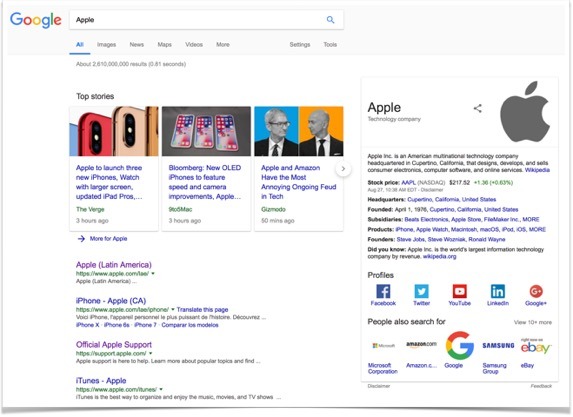23 October 2018
Schema Markup: Why should your business care?

Search engines are a powerful tool, but the race to the top of the search results has never been fiercer. Schema Markup can help you take the lead. But what is it exactly? And how can it help you make your online content as effective as it can be? Let’s dive in!
What’s schema.org?
It’s the most popular schema standardization unit. Quoting their homepage…
Schema.org is a collaborative, community activity with a mission to create, maintain, and promote schemas for structured data on the Internet, on web pages, in email messages, and beyond.
But, what is Schema Markup then? It’s a method for sharing specific information in a standardized manner. This information is then available for reuse by any external party. You can use Schema Markup to define many various types of data. One of the numerous examples could be essential organizational information. It includes data like address, email, name, logo, and much more, which I’ll talk about later in this article. Just remember that everything you choose to share in Schema Markup will become public and available for everyone to reuse.
But why should your business care?
It’s no secret that the primary goal of every business is to make money. And there are many different ways in which companies make a living. But, in almost every single case, they need either clients or recognition, usually both. Nowadays, the most popular way to get those is, of course, *the internet*. Now, everyone has a website, and thanks to the magic of search engines, we also have a very powerful tool to promote our websites. You want to be as high as possible in the search results because it makes your company recognizable. Plus, what’s more important, it leads to many of your potential clients finding your page over time.
Of course, it’s not that easy to get to the top of search engines because everyone wants to be there.
Proper implementation of SEO rules is a high starting point, but it’s often not enough… especially when you don’t have a lot of unique content on your site.
Here comes Schema Markup! If you help search engines understand your content and provide other information about yourself, you’ll get extra points in the tough positioning war. What’s more, the data you provide could be used to enrich your entry in the search results. Let’s take a look at one example – the Apple company:

As you can see, there’s a lot of information available publicly, like names, addresses, social profiles, and much more. Plus, at the top of the search results, you’re presented with „Top stories” articles. These are also being promoted by Google as they provide useful content as well as implement Article schema. They’re easy to understand and process by crawlers.
Schema Markup could not only make your page favored over the others but also help your search result entries become more appealing to the user (depending on your website’s content).
Take, for example, an implementation of product reviews on Amazon. By doing very little work and sharing such data in a standardized manner, you can take the lead in the search-engine-powered competition for clients. Here’s how it looks:

Of course, like with every solution, there’s a downside. Sometimes, additional details may cause the user to not enter your site. This happens when the enrichments already provide the user with the information he/she was looking for. But, most of the time, they will only make your search entry more appealing, generating more visitors aka potential clients.
So, how to implement Schema Markup?
Buckle up as there will be a few fancy technical words and code samples. But don’t worry, the context is very easy to understand.
To start, there are a few different implementation methods: RDFa (which is an HTML5 extension), Microdata (an open-community HTML specification), and JSON-LD. I won’t go into details here though. In this article, I’ll use JSON-LD format in all the examples. It’s currently the one recommended by Google.
Now, you have all the basic information you need. Let’s dive into an example implementation of an Organization Schema Markup. It’s the Apple implementation of what you saw above:
As you can see, it’s rather easy to understand and prepare, provided you follow the standard formula and fill it with your data.
Moreover, there’s an example implementation of Article Schema Markup on verge.com. It allowed Google to present their article in a very appealing way in the search results:
A piece of cake, isn’t it? And with great benefits.
Of course, schema.org doesn’t have an exclusive license to produce schemas. Nothing prevents you from using other options or even creating your own. I wouldn’t recommend it though. As schema.org markups are the most popular choice, their support is the most widespread and guarantees the best results.
Are you curious...
Beyond a search engine
So, you’ve already acquired many potential clients through the search engine, but could Schema Markup help you even more? The answer is: Yup!
Do you remember how I mentioned email at the beginning of this article? Thanks to the Email schema, you can improve the user experience and add cool stuff like action buttons, meeting invites, hotel cards, flight cards and more. The functionality will work only in the supported email clients, but it’s still worth it. Here are some examples, straight from Gmail:

But wait, there’s more.
Schema Markup can also help you improve your marketing. There are a lot of tools out there. Most of them probably already benefit from markup data, but, here, I’ll show you only Facebook Pixel as an example.
What is Pixel? Facebook says that it’s an analytics tool that helps you measure the effectiveness of your advertising. You can use Facebook pixel to understand the actions people are taking on your website and reach audiences you care about.
Long story short, Facebook Pixel uses your Schema Markup data to improve your ads, resulting in a more effective marketing campaign. For example, it gives you hints based on what products your users were browsing previously.
That’s not all the applications of schema.org, but the ones I’ve listed above are the most helpful on the web. If you’re more interested in things like IoT, the automotive field, or similar, feel free to explore their website. There, you can read about the types of schemas they provide for each of your use cases.
Future-proof business
As I’ve pointed out, implementing Schema Markup may turn out to be a very important step. After all, search engine positioning and enrichment are now the basic tools used to extend a company’s online reach. I’ve also shown you how to use Schema Markup in emails and marketing, but it has many more applications. Personal Assistants like Siri, Alexa or Google Now could also use your markup data! Wouldn’t you like these voice assistants to be able to provide information about our company? Or bring the user to your site and social media accounts?
This is only one example, but new possibilities are just around the corner, especially with the current popularization of deep learning. Nobody can predict the future, but, with Schema Markup, you’re already prepared for it!

To sum up, implementing Schema Markup is easy and will potentially provide various benefits, and your company can get more recognition and clients. Which, in turn, translates into earning more money. Not to mention, you’ll be able to make your business future-proof. That’s how good business should work.

